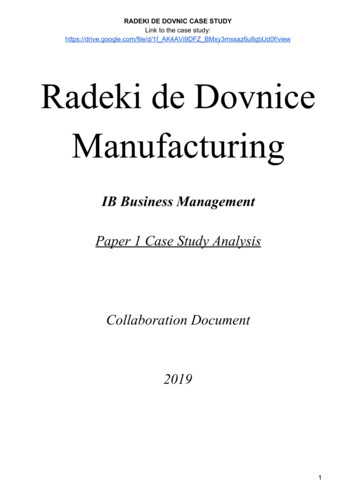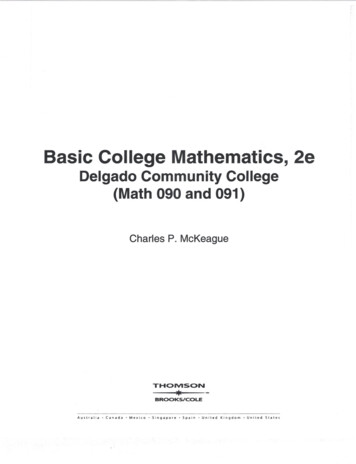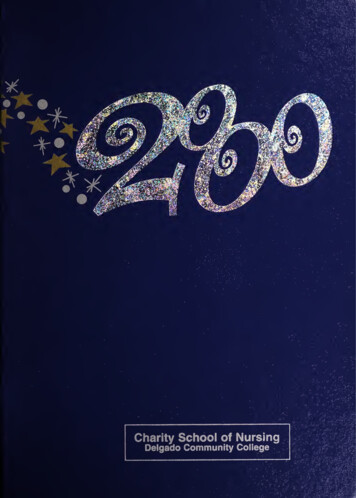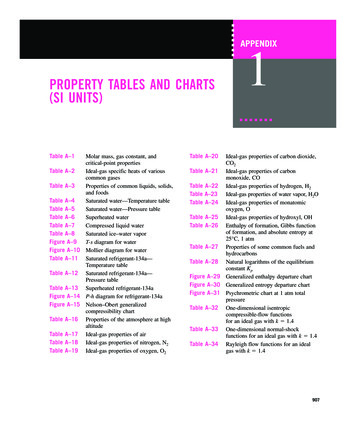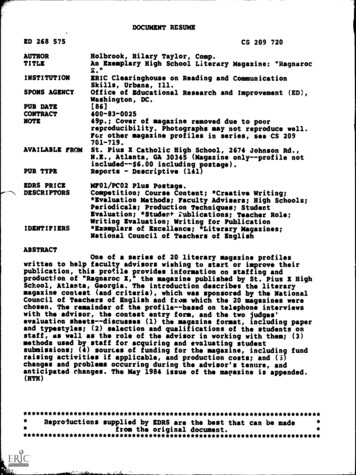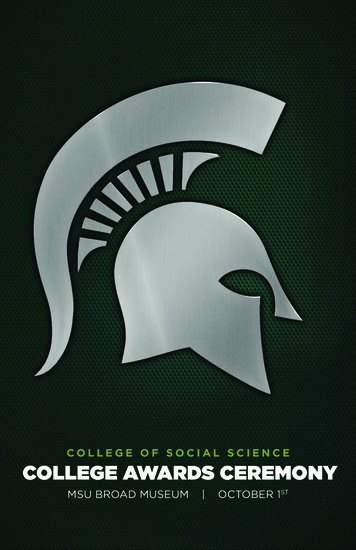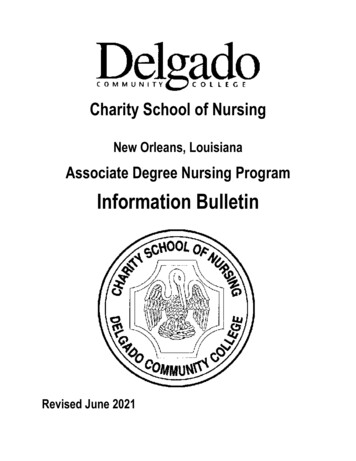
Transcription
Charity School of NursingNew Orleans, LouisianaAssociate Degree Nursing ProgramInformation BulletinRevised June 2021
ABOUT THIS BULLETINThe purpose of this bulletin is to provide information about the Associate Degree Nursing Program, and direction tothe individual interested in the R.N. program at Charity. It does not constitute a binding agreement on the part ofDelgado Community College Charity School of Nursing.The information in this bulletin is intended to be complete and accurate. However, since the program is part of adynamic professional field and educational system, substantive and procedural matters are subject to change. Anychanges in the policies or procedures subsequent to the printing of this document will be filed in the offices ofAdmissions and/or Registrar and printed in the ADN Student Handbook.This bulletin is to be used in conjunction with the Delgado Community College Catalog and DCC Class Schedule.Once the applicant is admitted, this bulletin is to be used in conjunction with the Charity School of Nursing ADNStudent Handbook.Delgado Community College is accredited by The Southern Association of Colleges and Schools Commission onColleges (1866 Southern Lane, Decatur, Georgia 30033-4097; Telephone number 404-679-4500) to awardCertificates and the Associate Degree. (Letters of Accreditation on file in Moss Memorial Library for student review).Delgado Community College Charity School of Nursing has full approval from the Louisiana State Board of Nursing(17373 Perkins Road, Baton Rouge LA 70810; Phone: 225-755-7500) and is accredited by the AccreditationCommission for Education in Nursing (3343 Peachtree Rd. NE Suite 850, Atlanta, Georgia 30326: 404-975-5000).Delgado Community College does not discriminate on the basis of race, color, national origin, sex, disability,religious or political affiliation, gender identity, sexual orientation, citizenship, age, disability, marital orveteran’s status, pregnancy, childbirth and related medical conditions, and the sickle cell trait in theadmission to, participation in, or employment in the programs and activities of this College. Title IXCoordinator can be reached at 615 City Park Ave., O’Keefe Administration Bldg., New Orleans, LA. 70119,(504) 76-3004 and 504/ADA Coordinator can be reached at 615 City Park Ave., Bldg. 2, Room 102, NewOrleans, LA 70119, (505) 671-5161.2
TABLE OF CONTENTSIntroduction 4The Profession of Nursing and Employment Opportunities 4Mission Statements 4Philosophy of Charity School of Nursing 5End of Program Student Learning Outcomes 5Academic Advising 6Admission Requirements 6Application Process 7Selection Process 7Limited Enrollment 7Technical Standards 8Professional Standards 9Legal Requirements 9Drug Screening 9Health Requirements for Accepted Students 9- 10Body Art 10Transfer Credit 10-11Options for Licensed Practical Nurses 11-12Options for Graduates of the DCC Practical Nursing Program 12Nursing Curriculum 13General Education Courses 13Required Related Courses 13-16Nursing Courses 17-19Pinning Ceremony/Commencement 19Eligibility for Licensure 19Support Services 19Learning Resources 20Health Services 20Student with Disabilities 20Student Organizations 20Transportation and Parking 21Crime Statistics 21Tuition and Fees 21Complaints 22Procedure for Appeal of Admissions Decision 22Schedule Information 23Important Addresses and Telephone Numbers 243
INTRODUCTIONThank you for your interest in nursing and the R.N. program at Delgado Community College Charity School ofNursing. We are proud of our school, our students and the graduates who complete the programs.Historically, Charity Hospital School of Nursing was founded as a diploma program in 1894 through the cooperativeefforts of the Charity Hospital New Orleans (CHNO) Board of Administrators, the Daughters of Charity of St. VincentDePaul, and the Louisiana State Legislature. In 1989, in response to a nursing shortage in Louisiana, officials fromDelgado Community College (DCC) announced their intentions to start an associate degree in nursing (ADN)program. In July 1990, the nursing school was officially transferred from CHNO to DCC and renamed DelgadoCommunity College Charity School of Nursing.The courses in the nursing major are designed to build upon one another and are taken over a five semester period.The school offers day classes and day and evening clinicals. As of May 2020, over 6,200 students have graduatedfrom the Delgado Community College Charity School of Nursing.Once a student successfully completes the program, the graduate applies to the Louisiana State Board of Nursing forpermission to take the National Council Licensure Examination for Registered Nurses (NCLEX-RN). Oncepermission is granted and the graduate successfully passes the exam, the graduate has the right and privilege to usethe title “RN”. Traditionally, a high percentage of the graduates of Charity School of Nursing pass the NCLEX-RN asfirst-time writers, consistently surpassing the state and national average.Semester credit hours earned at Delgado Community College Charity School of Nursing are accepted at otherinstitutions of higher learning. These institutions will evaluate the credits for applicability to their particular programsof study.THE PROFESSION OF NURSING AND EMPLOYMENT OPPORTUNITIESMany employment opportunities are available for registered nurses. Graduates of Charity School of Nursing findemployment in a variety of health care settings. These include full and part-time positions in hospitals, long-termcare facilities, hospices, outpatient clinics and home health agencies. The salary scale varies according to the typeof facility, its size and location as well as the shift and days the nurse works. Information on salaries can be obtainedfrom the health care facilities in the area.MISSION STATEMENTSDELGADO COMMUNITY COLLEGEDelgado Community College, a comprehensive community college, offers programs through the Associate degree.The College provides a learning-centered environment through face-to-face and distance education to preparestudents from diverse backgrounds to attain their educational, career, and personal goals, to think critically, todemonstrate leadership and to be productive and responsible citizens.CHARITY SCHOOL OF NURSINGThe nursing programs prepare students of varied backgrounds in a learner centered environment through face-toface and distance education to provide caring and competent nursing in entry level positions to meet the health-careneeds of a diverse community.4
PHILOSOPHY OFCHARITY SCHOOL OF NURSINGThe faculty of Delgado Community College Charity School of Nursing upholds the mission of Delgado CommunityCollege in supporting the educational and lifelong learning needs of a diverse multicultural community. CharitySchool of Nursing strives to prepare competent, technically-skilled graduates invested in a lifelong pursuit ofknowledge, the achievement of personal excellence, and a commitment to service to humankind by providingcompassionate, culturally-relevant nursing care.We believe that nursing is an applied discipline that works with diverse persons as patients across diverseenvironments to promote, maintain, and/or restore health. Nurses, applying both art and science, must provideholistic patient-centered care. Incorporating the qualities of compassion, cultural sensitivity, and competence, thenurse functions as a caregiver, change agent, leader, and role model who possesses the ability to anticipate needsand synthesize knowledge in diverse environments.The faculty affirms that nursing is a profession that exists in dynamic diverse environments which requires lifelonglearning, internalization of professional standards, and promotion of clinical competency through experience. Nursesmust safely, legally, and ethically practice in an interdisciplinary atmosphere amidst mutual trust and respect. Opencommunication, collaboration, and teamwork are integral to safe care, as well as to the emotional, intellectual,spiritual, and social development of persons. A strong sense of caring and community enables the nurse to adapt,manage conflict, and commit to the professions.The faculty knows that nurses serve persons as patients and their communities. Persons are unique multidimensional individuals and deserving of dignity, respect, and care regardless of any other consideration. Personsare also members of families or other aggregates that share mutual supports and beliefs, especially in relation tohealth.The faculty recognizes that the educational process empowers persons to be self-directed and to expand knowledge.The learner must assume an active role in a learning-centered environment that promotes interaction, reflection,mutual respect, and intellectual curiosity. Nurses, supported by evidence-based knowledge, combine experientiallearning with life experiences to enhance clinical reasoning. As the dynamic environments are constantly changingand evolving, the nurse must stay informed, committed to continued education and lifelong learning, and useinformatics to achieve positive patient outcomes while constantly striving to improve the quality of care.END of PROGRAM STUDENT LEARNING OUTCOMESBy the end of the program, the graduate will be able to:1. Individualize holistic health care using the nursing process while incorporating best practices with the patient asan active participant.2. Manage the delivery of health care by using sound clinical judgment and leadership skills.3. Exemplify personal, professional and ethical responsibility.4. Communicate effectively with health care team and individuals.5. Formulate clinical decisions utilizing information technology and research.6. Collaborate effectively with the interdisciplinary team members to advocate for positive health outcomes.7. Ensure adherence to principles of quality improvement to promote excellence and safety in health care.5
ACADEMIC ADVISINGStudents should seek advising from the appropriate source as they move toward the goal of acceptance into theSchool of Nursing. Pre-nursing advisors are available at the City Park, West Bank and Sidney Collier sites.A student admitted to the nursing program is assigned a nursing faculty advisor. Academic advising is also readilyavailable from the Level Coordinators and clinical instructors.ADMISSION REQUIREMENTS An overall grade point average of 2.500 in any general education and required related courses in the Schoolof Nursing curriculum.Grade of “C” or higher in all required related courses and general education coursesDelgado Community College GPA of 2.000 or higher, if applicable.Nursing School Admission Exam scoreso Test MUST be taken at Delgado Community College, before submitting online application.o The admission exam may be taken only once during each application period.o More information on this examination can be obtained from the DCC Office of Advising and TestingCenter on the City Park Campus. The phone number is (504) 671-5080 ult.aspxAbility to meet the technical standards as attested to on the nursing application.A student may not have four or more enrollments resulting in grades D, F or W in Human Anatomy andPhysiology I and II (BIOL 251, 253, 252 and 254) or the equivalent, taken within the last 5 years of possibleentry into the program.Completion of at least 4 credit hours of Anatomy and Physiology I (3hrs. of lecture; 1 hr. lab), 3 credit hoursof English Composition and 3 hours of non-remedial Mathematics are required before applying.Generic Level I Requirements: Completion of 4 credit hours of Anatomy and Physiology I (3 credit hrs. oflecture; 1 hr. of lab), English 101 (3 credit hrs.), Math (3 credit hrs. of non-remedial Math) are requriedbefore applying. (10 Credit Hours)Transitions Requirements for Fall or Spring Admission: Must be a licensed LPN in good standing withthe Louisiana State Board of Practical Nurse Examiners. Completion of 8 credit hours of Anatomy andPhysiology I (3 credit hrs. of lecture; 1 hr. of lab), Anatomy and Physiology II (3 credit hrs. of lecture; 1 hr. oflab), English 101 (3 credit hrs.), English 102 (3 credit hrs.), Math (3 credit hrs. of non-remedial Math),Microbiology (3 credit hrs. Biol 210 or BIOL 211), General Psychology (3 credit hrs.), Fine Arts orHumanities Elective (3 credit hrs.) are required before applying. (26 Credit Hours)Transitions Requirements for Summer Admission: Must be a licensed LPN in good standing with theLouisiana State Board of Nursing. Completion of all 32 credit hours of general education and requiredrelated courses.Advanced Placed Requirements: Must be a licensed Delgado Community College LPN graduate, withinone year of graduation and in good standing with the Louisiana State Board of Practical Nurse Examiners.Completion of 8 credit hours of Anatomy and Physiology I (3 credit hrs. of lecture; 1 hr. of lab), Anatomy andPhysiology II (3 credit hrs. of lecture; 1 hr. of lab), English 101 (3 credit hrs.), Math (3 credit hrs. of nonremedial Math), General Psychology (3 credit hrs.), Fine Arts or Humanities Elective (3 credit hrs.) arerequired before applying. (20 Credit Hours)6
APPLICATION PROCESS1.Go to www.dcc.edu and complete online application for admission to the College if not already a Delgadostudent.2.Complete a Kaplan Pre-Nursing Exam prior to submission of your Nursing application.3.Go to the RN program page of the Delgado website and complete the online application and Curriculum SelfAssessment form.4.Transfer students will need to submit a Transfer Reference Form if they have attended another clinical NursingProgram within the last 5 years. Email the supporting documents following the directions on the RN AdmissionsRequirements form. Be sure to complete the document packet for the correct program to which you are applying. No applicant will be considered for admission until all of the required documents are received in theadmissions office. Application and all supporting documents must be received by the close of the application period in order tobe considered for admission. It is the responsibility of the applicant to ensure that all transfer credits have been approved by theRegistrar’s Office and are posted on their LOLA online transcript. Coursework not posted on the LoLAtranscript will not be included in the application evaluation process.Note: Falsification of any admissions requirements documentation will result in denial of admission into theprogram. The student may be subject to a judicial procedure through the College.SELECTION PROCESSAcceptance to the School of Nursing is based on the criteria listed in this Bulletin. Applicants are considered foradmission by the Admissions Committee of Charity School of Nursing. Applicants are identified by a number and notby name during the selection process. Selection of applicants is based on the applicant’s “Profile Score”which is composed of the following:1.2.3.4.5.6.GPA of 2.5 or higher for any of the general education and required related courses in the School of Nursingcurriculum and an Institutional (DCC) GPA of 2.0 for all college work attempted.Number of grades of D’s and/or F’s in courses taken over the past 5 years that are required in the School ofNursing curriculum. Even if the course has been repeated with a higher grade, or if academicamnesty/renewal has been granted, the D or F is still counted.Number of withdrawals in courses taken over the past 5 years that are required in the School of Nursingcurriculum. Even if the course has been repeated with a passing grade, or if academicamnesty/renewal has been granted, the W is still counted.Number of completed credits in the required related and general education courses in the nursingcurriculum.Admission exam scoresBonus points are added to the profile score for attainment of LPN license or college degree from aregionally-accredited college.LIMITED ENROLLMENTWhen the number of qualified applicants exceeds the enrollment capacity, the committee will accept the mostqualified applicants (highest profile scores) for the class. Applicants not admitted will be required to submit a newapplication packet for consideration for the next class.7
DEFERMENT OF ENTRYAn applicant, who is accepted to the School of Nursing for a particular class and is unable to enroll, may request one(1) postponement of entry. A written request to defer entry must be received one (1) month before the beginning ofthe semester. Accepted applicants who wish to defer a second time must submit a new RN application and be reaccepted by the Admissions committee.DEFINING THE CATALOG YEARDelgado students taking their pre-requisites at the College under the nursing major and accepted for a specific classat the School of Nursing, continue in the same catalog if their major has been nursing and the student did not have abreak in semesters (e.g. Fall or Spring) before coming into the program. Continuing Delgado students, who declareda major other than nursing while taking their pre-requisites, enter as a nursing major under the catalog in effect at thetime they begin the nursing program. Catalog year begins with the Fall Semester and ends with the summer session.For example, if a student starts in spring 2020 or summer 2020 at the College, the catalog year beginning fall of 2019must be followed.Transfer students enter under the catalog in effect at the time of entrance to the nursing program.TECHNICAL STANDARDSStudents must meet the required technical standards of nursing practice. Technical standards reflect the abilitiesrequired to provide safe, competent nursing care. The student must have1. Communication skills in speech and writing, in the English language.2. Speaking ability to be able to converse with a patient about their condition and to relay information about thepatient to others.3. Interpersonal skills to adapt and interact with individuals, families and groups from various socioeconomic,cultural, and intellectual backgrounds.4. Hearing ability with auditory aids to understand the normal speaking voice without viewing the speaker’sface (to ensure that the nurse will be able to attend to a patient’s call for help either softly or as a cry) and tohear high and low pitched sounds with a stethoscope.5. Visual acuity with corrective devices to identify visual changes in a patient’s condition/color, perceive depthof injections, or to see small numbers on medical supplies.6. Sense of smell sufficient to detect odors.7. Sense of touch sufficient to perform palpation, percussion, and distinguish temperature changes.8. Strength and psychomotor coordination necessary to perform technical nursing procedures andcardiopulmonary resuscitation (at floor or bed level) including lifting and carrying (at least 20 lbs.) andpushing or pulling an adult patient of average weight in a wheelchair or on a stretcher.9. Motor skills requiring manual dexterity such as putting on sterile gloves, preparing medications in syringes,giving injections, or inserting various tubes and catheters.10. Emotional ability to manage stress and adapt to changes in the environment or a patient’s behavior/healthstatus in an effective, therapeutic manner including responding to anger, fear, hostility, and violence ofothers.11. Problem solving/critical thinking ability to:a. Collect, read and interpret data.b. Use the data to plan and implement a course of action.c. Prioritize and adapt care.8
d. Evaluate the action taken.12. Stamina to fulfill the requirements of the program and customary requirements of the profession, e.g. sit,stand, stoop, kneel, climb and/or bend for a period of time and work in areas that are confined and/orcrowded during a clinical experience which may last up to 12 hours.PROFESSIONAL STANDARDSUpon entry into the nursing program, students are beginning their socialization into the profession and must abide bya strict code of professional conduct. The discipline of nursing requires a high level of academic and personalintegrity. Students must adhere to the ANA code of Ethics for Nurses, Nursing: Scope and Standards of Practice,Louisiana Nurse Practice Act, DCC Student Judicial Code, and Charity School of Nursing Honor Code. Students arerequired to adhere to the policies and procedures of the College, courses and affiliated clinical agencies.During the course of study in the School of Nursing, a student will be required to provide supervised care to personswith communicable diseases, such as but not limited to, tuberculosis and hepatitis, and to persons who are HIVpositive. Please consider your willingness to give compassionate care to all persons, regardless of status or medicaldiagnosis before beginning a nursing career. Additionally, the student must be free of health problems that wouldinterfere with the safety and welfare of patients.LEGAL REQUIREMENTSPatients have a right to expect that nurses entrusted with their care will be honest and trustworthy.After acceptance to a school of nursing and prior to enrolling in a clinical nursing course, the Louisiana State Board ofNursing (LSBN) requires the student to complete an online application for permission to enroll in a clinical nursingcourse that includes questions about arrests, citation, summons, previous licensure, medical, physical, mental,emotional or psychiatric history, use of mood altering substances, including drugs and alcohol.If “yes” is answered to any of the questions, the LSBN will require additional documentation. LSBN requiresfingerprinting and a criminal records background check (Louisiana Department of Public Safety and Federal Bureauof Investigation) upon initial enrollment and again before licensure. Based on the criminal history record, the LSBNmay approve the student to enroll in clinical nursing courses in accordance with the individual program guidelines, orthe LSBN may deny, delay or otherwise restrict the enrollment of the students in clinical nursing courses.DRUG SCREENINGDrug screening is required before a student can attend a clinical experience. The screening is done after acceptanceand is at the student’s expense. A positive result may affect a student’s enrollment in the nursing program. Drugscreening for cause, or at random, may occur during program enrollment.HEALTH REQUIREMENTS FOR ACCEPTED STUDENTSPrior to enrollment in the first nursing courses, the following health documentation must be submitted by thedesignated deadline: Physical Exam (due date to be determined upon admission and updated annually once enrolled) Hepatitis B Titer (If you haven’t received the immunization series, it is 3 injections given over a 6 monthperiod. After the series, you can get the titer) MMR titer Varicella titer9
Tdap booster within 10 yearsTuberculosis Skin or blood test (updated annually once enrolled)Flu Vaccination (updated annually once enrolled)CPR (American Heart Association, Basic Life Support)Liability Insurance (updated annually once enrolled)Upon acceptance, the applicant will receive further information regarding legal and health requirements. A studentmay be denied enrollment if the health requirements are not fulfilled and documented by the deadline. Students whoare unable to meet the health requirements cannot be guaranteed placement in clinical facilities, therefore,completion of the program may be impacted.BODY ARTBody art that is extremely large, numerous or portrays slogans or pictures that may be perceived as vulgar oroffensive must be covered. Clinical agencies may not allow body art to be visible while in uniform. Students mustfollow the policy of the clinical agency in regard to body art. Because clinical agency policies vary, clinical placementmay be affected. If a student cannot be placed in a clinical site, the student may not be able to continue in theprogram.TRANSFER CREDITNON-NURSING COURSESAcademic credits are accepted from other regionally accredited institutions of higher learning and will be evaluatedfor equivalency to DCC courses. Courses deemed not equivalent cannot be applied toward the required courses inthe Nursing curriculum. The acceptance of required and required related courses over ten (10) years old will bedetermined by the Dean. It is the responsibility of the applicant to ensure that all transfer credits have been approvedby the Registrar’s Office and are posted on their LOLA online transcript. Coursework not posted on the LoLAtranscript will not be included in the application evaluation process.NURSING COURSESNursing courses completed at another regionally accredited registered nursing program will be evaluated forequivalency to the nursing courses at CSN. Students wishing to transfer from another school of nursing must do thefollowing:1. Meet the DCC and CSN admission requirements. All Admission and Academic policies apply to the transferstudent including those courses that are considered NURS in the CSN curriculum.2. Submit an application to the school of nursing3. Submit a letter of good standing from the Dean or Director of the accredited School of Nursing to include thefollowing information:a. applicant’s status at time of withdrawalb. eligibility to return to nursing schoolc. disciplinary action, if any, taken against applicantd. any academic probations or suspensions4. Present documentation of content for the nursing courses completed. The documentation should be in theform of course syllabus (theory and clinical) and catalog descriptions.5. Meet the academic requirements as to the number of grades of D’s, F’s or W’s in nursing or relatedcourses. A student who has unsuccessful grades (D’ s and F’s) in greater than 10 hours of nursing coursesor nursing related courses is ineligible for admission into CSN nursing program. A minimum grade of “C” isrequired in all nursing, required related and general education courses in the nursing curriculum. All credit10
for Nursing courses must be earned within a (5) five-year period. The five-year time frame begins with thefirst enrollment in any NURS course.STUDENTS ACCEPTED FOR TRANSFER:1. Must meet all health requirements, CPR and all insurance requirements.2. Must meet the time limit of 5 years to complete all the nursing courses.3. May enroll pending availability of space in the course(s).Transfer students who have not been enrolled in a nursing program for 3 or more semesters must request admissionto first year nursing courses.Note: The appropriate Level Coordinator and the Dean will make the final determination of the transferability ofthe nursing course(s). No partial credit will be given.Transfer students will be considered by the Admissions Committee after all the necessary documentation issubmitted. An appointment should be made with the Nursing Admissions Director at 504-571-1270 to discussindividual circumstances.OPTIONS FOR LICENSED PRACTICAL NURSESLPNs have the option of completing the Charity School of Nursing curriculum through one of three tracks:1. Generic - complete the entire curriculum2. LPN-RN Transition3. Advanced Placement for students who completed the DCC Practical Nursing Program within one yearof graduation.These tracks are described in more detail below. Admission to Charity School of Nursing and proof of currentunencumbered LPN licensure are required for Tracks 2 and 3.Track 1:The student
Community College Charity School of Nursing. The courses in the nursing major are designed to build upon one another and are taken over a five semester period. The school offers day classes and day and evening clinicals. As of May 2020, over 6,200 students have graduated from the Delgado Community College Charity School of Nursing.

